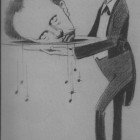Salome
Tours by decade
1950s - 2 tours
- 1952 - Covent Garden Opera
- Fully Staged with Orchestra
- 1956 - Hamburg State Opera
- Fully Staged with Orchestra
1970s - 1 tour
- 1975 - Deutsche Oper, Berlin
- Fully Staged with Orchestra
1980s - 1 tour
- 1989 - Edinburgh International Festival
- Fully Staged with Orchestra
1990s - 2 tours
- 1990 - Scottish Opera
- Fully Staged with Orchestra
- 1993 - Scottish Opera
- Fully Staged with Orchestra
2000s - 1 tour
- 2000 - Scottish Opera
- Fully Staged with Orchestra
2010s - 3 tours
- 2012 - Derek Watson
- Study Programme
- 2018 - Opera North
- Concert performance
- 2018 - Edinburgh Players Opera Group
- Concert performance
2020s - 1 tour
- 2022 - Edinburgh International Festival
- Concert performance
Tours by location
Scotland, UK - 14 entries
- 1952 - Covent Garden Opera
- Glasgow
- 1956 - Hamburg State Opera
- Edinburgh
- 1975 - Deutsche Oper, Berlin
- Edinburgh
- 1989 - Edinburgh International Festival
- Edinburgh
- 1990 - Scottish Opera
- Glasgow
- 1990 - Scottish Opera
- Aberdeen
- 1990 - Scottish Opera
- Edinburgh
- 1993 - Scottish Opera
- Glasgow
- 2000 - Scottish Opera
- Glasgow
- 2000 - Scottish Opera
- Edinburgh
- 2012 - Derek Watson
- Edinburgh
- 2018 - Opera North
- Perth
- 2018 - Edinburgh Players Opera Group
- Edinburgh
- 2022 - Edinburgh International Festival
- Edinburgh
England, UK - 1 entry
- 1990 - Scottish Opera
- Newcastle-upon-Tyne
Music
Richard Strauss (born Munich, 11 June 1864; died Garmisch, 8 September 1949)
Text
Hedwig Lachmann, adapted by the Composer.
Source
Tragedy (1893) by Oscar Wilde (1854-1900).
Premières
First performance: Dresden (Semper Opernhaus), 9 December 1905.
First UK performance: London (Covent Garden), 8 December 1910.
First performance in Scotland: Glasgow (King’s Theatre), 19 March 1952 (maybe earlier).
Scottish Opera première: Glasgow (Theatre Royal), 25 April 1990.
Background
Salome is now one of the most popular operas in the repertoire, performances limited only by the difficulty of finding sopranos able to perform the title role effectively, and the cost of the large orchestra required.
However, at the outset it was a highly contentious subject for an opera, in spite of its importance as a subject for painting.
The subject matter being drawn both from biblical texts and from a play by the still disgraced (though safely dead) Oscar Wilde, made the piece controversial and it was initially banned from performance in Britain, until after the success of Elektra.
Salome’s Dance quickly became a popular showpiece for separate performance in orchestral concerts, just as the closing scene is often sung in concert by sopranos who would not perform the complete role.
Main Characters
Narraboth, a young Syrian, Captain of the Guard (tenor)
Page to Herodias (mezzo-soprano)
Jokanaan, John the Baptist (bass-baritone)
Salome, daughter of Herodias (soprano)
Herod Antipas, Tetrarch of Judea (tenor)
Herodias, wife of Herod (mezzo-soprano)
Plot Summary
From the terrace of Herod’s palace at Tiberias, Narraboth and the page observe a banquet going on inside. Narraboth is infatuated with the young princess, Salome, and the page warns him that she is not as sweet as she looks.
They are interrupted by a voice from the dungeon. This is John the Baptist demanding that the corrupt rulers repent of their sins. Salome comes out from the hall. She is bored, and becomes fascinated by the voice from below.
She orders Narraboth to have him brought up to her. When he arrives he continues to denounce the morals of Herod and Herodias. However Salome reveals her interest in him, and he turns his contempt on her. This only enflames her still more. Narraboth is driven to despair by her behaviour and kills himself. Salome does not even notice.
As the banquet ends, the courtiers come out to the terrace, and Herodias taunts her husband. He finds his stepdaughter more interesting than his wife. A group of Jews want the Baptist to be put on trial, but Herod is not prepared to do this since he considers Jokanaan to be a holy man. To provide a diversion, he asks Salome to dance. She refuses until he increases the stakes by promising her anything she may care to ask for. Salome then performs the Dance of the Seven Veils. As a reward she demands the head of Jokanaan on a silver platter. Herod is horrified, and Herodias delighted.
The debate continues as he offers her various extravagant alternatives, but Herod is cornered, and at last gives in. After the courtiers have watched in fascinated horror as Salome sings her extended love song to the head, Herod orders the guards to kill her.
The Cast
- Cappadocian
- Executioner
- Fifth Jew
- First Jew
- First Nazarene
- First Soldier
- Fourth Jew
- Herod Antipas
- Tetrarch of Judaea
- Herodias
- wife of Herod
- Jokanaan
- John the Baptist
- Narraboth
- a young Syrian, Captain of the Guard
- Page
- to Herodias
- Salome
- daughter of Herodias
- Second Jew
- Second Nazarene
- Second Soldier
- Slave
- to Herodias
- Third Jew
